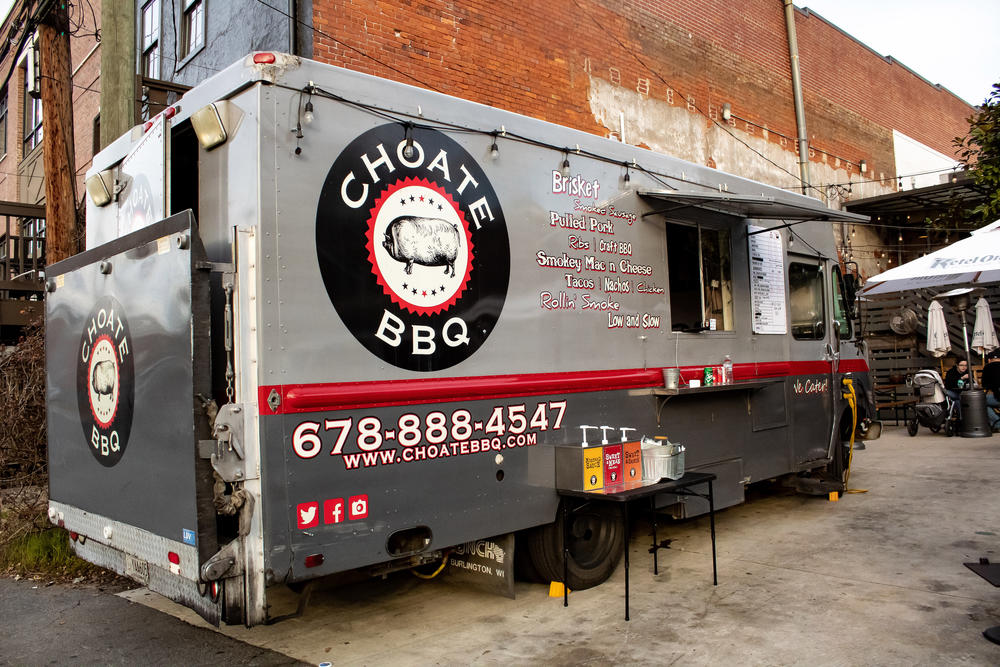
Caption
The Choate BBQ food truck parked outside of Truck and Tap, a craft brewery that hosts different food trucks in Woodstock, Georgia on Feb. 16.
Credit: Sarah Swetlik/Fresh Take Georgia
Jasmine Beck had big dreams for her vegan food truck, Sunshine Alchemy. But within just a year of starting her business, she’d spent $20,000 in fees and permits to operate in Georgia.
“I did cry a lot,” Beck said, “You get home after a really terrible event and realize you didn’t make money. You lost money and you worked for 10 hours — it’s crazy.”
Food truck owners say they’re frustrated with what they describe as Georgia’s complex permitting bureaucracy. In addition to a business license, the Georgia Department of Public Health requires a health permit and a separate inspection for each county the truck operates in.
This can become troublesome for operators because Georgia has 159 counties, including 29 counties in metro Atlanta.
“Some food trucks get inspected 30 or 40 times a year,” Beck said. “Right now, I’m only permitted in three counties, but that costs me over $2,000, plus all of the inspections.”
Beck has used her experience to help other food truck owners, overseeing training and development for The Food Truck Association of Georgia. The organization is urging supporters to call Gov. Brian Kemp’s office or complete a request online asking the governor to spearhead reforms to ease the process and lower operational costs.
“We’re asking for Governor Kemp to cut the red tape and give us the autonomy and flexibility to operate and meet standards while operating in any county we choose,” said Tony Harrison, president of the board of directors at the association.
Harrison said he’d like to see a statewide permit that would allow operators to sell food anywhere in Georgia.
While Harrison said customers are largely supportive, association members have heard criticism from some people worried about competition from food trucks hurting brick and mortar restaurants.

The Choate BBQ food truck parked outside of Truck and Tap, a craft brewery that hosts different food trucks in Woodstock, Georgia on Feb. 16.
A study conducted by the Institute for Justice, a non-profit civil liberties law firm, concluded those fears are unfounded.
“In opposition to reform, you’ll hear restaurants saying that food trucks hurt their businesses,” said Meagan Forbes, legislative counsel at the institute. “What we found through our research is that food trucks do not negatively impact restaurants, and in fact may actually help them.”
Food trucks increase foot traffic and help revitalize underdeveloped areas, which also benefits restaurants, the study concluded.
Daniel New, the director of advocacy at the Georgia Restaurant Association, said in a statement the organization “supports Georgia Public Health officials in working with the private sector to ensure that guidelines managing the sales of food from a mobile location meet all state requirements ensuring the service of safe and wholesome food.”
Some restaurants have launched their own trucks.
Levi Brock was serving barbecue macaroni and cheese out of the food truck from Ball Ground, Georgia-based Choate BBQ one recent evening at Truck & Tap, a brewery in Woodstock that advertises craft beer and casual dining outside.
The barbecue truck was the only one serving that night and patrons gathered around picnic tables sampling foods like baked beans and tacos. Some brought dogs while others brought their families, and many sipped on drinks from the brewery. As each customer ordered, Brock gave suggestions or complimented their choice.
“It’s always nice to see how people like your food, and different areas give you different feedback,” said Brock.

Levi Brock and Megan Eaves of Choate BBQ smile inside their food truck while serving in Woodstock, Georgia on Feb. 16.
Meanwhile, some owners said they are still struggling to speed up operation delays.
Jonny Womack of Jonny Boy Cookies in Statesboro, Georgia, is required to file special permits with the Department of Agriculture because he operates a truck that sells baked goods.
“We’re a bakery, which is different than most of the other trucks in the industry,” Womack said. “A lot of times, they have no idea what to do with us because there aren’t that many dessert trucks.”
Womack said the community has responded well to his bright yellow “cookie wagon,” as he calls it. But the process of inspections and certifications is especially slow for a mobile bakery, Womack said.
“Everything we’ve done has taken an extra four to six weeks,” Womack said.
Beck and Womack said they have struggled to stay afloat amid the pandemic, which has hurt many small businesses. They said they would like to continue operating food trucks but spend less on overhead costs.
“With food trucks, you see authenticity and creativity,” Beck said. “People love to see the entrepreneurial spirit of food trucks.”